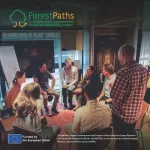(Press-News.org) Issues of identity, male-dominated branding and apprehension that their needs will go unmet are among the reasons women are not accessing veterans’ mental health support, according to new research being discussed today (Wednesday, 13 December) at a conference in Cambridge.
The report, I don’t feel like that’s for me: Overcoming barriers to mental healthcare for women veterans, was carried out by the Centre for Military Women’s Research (CMWR) at Anglia Ruskin University (ARU), to investigate the low numbers of ex-servicewomen engaging with veteran-specific mental health services.
The report was funded by the National Institute for Health and Care Research (NIHR) and will be presented today at the CMWR’s inaugural conference in Cambridge, which features international perspectives on sexual violence in the military. This conference is the first in the UK to focus on this topic.
There are approximately a quarter of a million female veterans in England and Wales, making up 13.6% of the veteran community of 1.85million, but the report found many “fall through the gaps” between civilian and military mental health provision.
The researchers interviewed 48 women veterans in England who had experienced a mental health challenge within the past five years, along with 12 mental health professionals. Guidance for working with women veterans in mental health services was co-created with women veterans.
The report found mental health challenges were often not solely related to combat or deployment experiences, and identified several reasons why women veterans may not engage with veteran-specific mental health support, including:
Not identifying with the term ‘veteran’
A lack of awareness of available support for veterans
A perception that veteran services did not understand the needs of women
Male-dominated service branding
Practical barriers associated with care responsibilities
One Royal Air Force veteran, who served between 1989 and 1996, said: “It was only recently that I viewed myself as a veteran, so I kind of dismissed anything to do with the military in terms of accessing any support”
An Army veteran, who served from 1999-2002, added she felt military support organisations were “not going to be able to understand me talking about my sexual assault, sexual harassment, or discrimination. And it would almost feel like that organisation as a whole would be rolling their eyes on the end of the phone.”
Principal investigator Dr Lauren Godier-McBard, Associate Professor and co-director of the Centre for Military Women’s Research at Anglia Ruskin University (ARU), said: “Our report found that women veterans experienced mental health challenges for many reasons related to both their military service and transition into civilian life, from facing discrimination or sexual violence in their service role, to struggling with identity or caring responsibilities.
“It appears from the interviews we carried out that many ex-servicewomen feel they fall through the gaps between mental health services for civilians and military veterans. Many did not identify with the word ‘veteran’, considering it to be a male label or preferring to identify with the various other roles in their life, such as being a parent.”
Lead author of the report, Abigail Wood, Research Fellow at the Centre for Military Women’s Research at ARU, added: “To encourage women to approach services in the first place, improving the visibility of women in service branding and materials was seen as critical. Clinician understanding of both the military lifestyle and women’s unique military experiences was considered important, as was giving women veterans the choice of clinicians based on their military background and gender, and the option of women-only treatment groups.
“There are plenty of services that offer support to women veterans, and hopefully this report will assist those services and veterans themselves to ensure that more people reach out for mental health help.”
Patricia Price, peer researcher at ARU and Army veteran, said: "What all women veterans want is to be seen and heard, without pre-judgement, without a tick box and without being seen as the cause of the issue they need support to resolve. We are equally as deserving of support, recognition and respect as each and every other professional member of the Armed Forces and each and every other Armed Forces Veteran is.
“Women in the Armed Forces are entitled to a successful and fulfilling veteran life. We simply must do better for them.”
END
Mental health care gaps for women veterans - report
New research finds ex-servicewomen feel excluded from civilian and military support
2023-12-13
ELSE PRESS RELEASES FROM THIS DATE:
National policy aimed at reducing U.S. greenhouse gases also would improve water quality
2023-12-13
WEST LAFAYETTE, Ind. — A climate policy that raises the price of carbon-intensive products across the entire U.S. economy would yield a side benefit of reducing nitrate groundwater contamination throughout the Mississippi River Basin.
The Gulf of Mexico, an important U.S. fishery, also would see modest benefits from the nitrate reductions. These were among the conclusions of a recent study published in the Proceedings of the National Academy of Sciences (PNAS).
The study, led by four early career researchers, three of them from ...
Twenty-year study confirms California forests are healthier when burned — or thinned
2023-12-13
Berkeley — A 20-year experiment in the Sierra Nevada confirms that different forest management techniques — prescribed burning, restoration thinning or a combination of both — are effective at reducing the risk of catastrophic wildfire in California.
These treatments also improve forest health, making trees more resilient to stressors like drought and bark beetles, and they do not negatively impact plant or wildlife biodiversity within individual tree stands, the research found. The findings of the experiment, called the Fire Surrogate Study, were published today in the journal Ecological Applications.
“The research ...
Caregiving can be stressful, but it could also lower risk of depression
2023-12-12
Becoming a caregiver to an aging parent or spouse can be stressful, but a new study from a researcher at The University of Texas at Austin is questioning the idea that family caregiving is also a risk factor for depression.
The study, published in the journal Advances in Life Course Research, found that depression in adult caregivers is mostly driven by having a loved one experiencing serious health problems, while becoming a caregiver is associated with fewer symptoms of depression.
“Decades of research on this topic indicate that there are positive and negative aspects to being a caregiver,” said Sae Hwang Han, ...
UCF researcher discovers new technique for photon detection
2023-12-12
University of Central Florida researcher Debashis Chanda, a professor at the NanoScience Technology Center, has developed a new technique to detect photons — elementary particles that span from visible light to radio frequencies and are instrumental in carrying cellular communication.
The advancement could lead to more precise and efficient technologies in various fields, from improving medical imaging and communication systems to enhancing scientific research and even potentially bolstering security measures.
Photon detection has typically relied on change/modulation of voltage or ...
Fat flies live longer on a diet at any age
2023-12-12
Old, obese flies get healthier and live longer if put on a diet, University of Connecticut researchers report on Dec. 8 in PNAS. If the effect holds true for humans, it would mean it’s never too late for obese people to improve their health with diet.
For way too many of us, eating too much goes along with getting old and a tendency to be obese. Different health organizations define obesity differently, but all agree it means having too much body fat, and is associated with a host of diseases related to metabolism including heart disease and diabetes. Many animal studies have shown that eating less—meaning sharply ...
European Policy Lab gathers stakeholders to map forest policy opportunities and barriers
2023-12-12
ForestPaths’ first Policy Lab convened stakeholders in Helsinki, Finland, on 27-29 September 2023. Nineteen carefully selected participants with diverse expertise – including research, policy, governance, civil society, value chain professionals, and forestry practitioners – engaged in discussions on forest-based policymaking and modelling related to climate change and biodiversity.
Tasked with considering policy actions given different timescales, governance paradigms, enablers, and barriers, participants contributed ...
Tat-heat shock protein 10 ameliorates age-related phenotypes in the hippocampus
2023-12-12
“Mitochondrial dysfunction is a major cellular change observed in the hippocampus during aging.”
BUFFALO, NY- December 12, 2023 – A new research paper was published in Aging (listed by MEDLINE/PubMed as "Aging (Albany NY)" and "Aging-US" by Web of Science) Volume 15, Issue 22, entitled, “Tat-heat shock protein 10 ameliorates age-related phenotypes by facilitating neuronal plasticity and reducing age-related genes in the hippocampus.”
In this new study, researchers Hyo Young Jung, Hyun Jung Kwon, Kyu ...
MIT researchers observe a hallmark quantum behavior in bouncing droplets
2023-12-12
In our everyday classical world, what you see is what you get. A ball is just a ball, and when lobbed through the air, its trajectory is straightforward and clear. But if that ball were shrunk to the size of an atom or smaller, its behavior would shift into a quantum, fuzzy reality. The ball would exist as not just a physical particle but also a wave of possible particle states. And this wave-particle duality can give rise to some weird and sneaky phenomena.
One of the stranger prospects comes from a thought experiment known as the “quantum bomb tester.” The experiment proposes that a quantum particle, such ...
Smoking causes brain shrinkage
2023-12-12
Smoking shrinks the brain, according to a study by researchers at Washington University School of Medicine in St. Louis. The good news is that quitting smoking prevents further loss of brain tissue — but still, stopping smoking doesn’t restore the brain to its original size. Since people’s brains naturally lose volume with age, smoking effectively causes the brain to age prematurely, the researchers said.
The findings, published in Biological Psychiatry: Global Open Science, help explain why smokers are at high risk of age-related cognitive decline and Alzheimer’s disease.
“Up until recently, scientists have overlooked ...
Mammogram rates increase when patients schedule themselves
2023-12-12
PHILADELPHIA— Having the ability to self-schedule mammograms was associated with a 15 percentage point increase following through with getting the screening, according to research from the Perelman School of Medicine at the University of Pennsylvania. The paper was published today in the American Journal of Preventive Medicine.
“Self-scheduling helps make the path to mammogram completion a little smoother, where you don’t have to find the time to call a scheduling line, wait on hold, or go back and forth trying to find an appointment that works for your schedule,” said the study’s lead author, Kimberly Waddell, ...
LAST 30 PRESS RELEASES:
New tool reveals the secrets of HIV-infected cells
HMH scientists calculate breathing-brain wave rhythms in deepest sleep
Electron microscopy shows ‘mouse bite’ defects in semiconductors
Ochsner Children's CEO joins Make-A-Wish Board
Research spotlight: Exploring the neural basis of visual imagination
Wildlife imaging shows that AI models aren’t as smart as we think
Prolonged drought linked to instability in key nitrogen-cycling microbes in Connecticut salt marsh
Self-cleaning fuel cells? Researchers reveal steam-powered fix for ‘sulfur poisoning’
Bacteria found in mouth and gut may help protect against severe peanut allergic reactions
Ultra-processed foods in preschool years associated with behavioural difficulties in childhood
A fanged frog long thought to be one species is revealing itself to be several
Weill Cornell Medicine selected for Prostate Cancer Foundation Challenge Award
Largest high-precision 3D facial database built in China, enabling more lifelike digital humans
SwRI upgrades facilities to expand subsurface safety valve testing to new application
Iron deficiency blocks the growth of young pancreatic cells
Selective forest thinning in the eastern Cascades supports both snowpack and wildfire resilience
A sea of light: HETDEX astronomers reveal hidden structures in the young universe
Some young gamers may be at higher risk of mental health problems, but family and school support can help
Reduce rust by dumping your wok twice, and other kitchen tips
High-fat diet accelerates breast cancer tumor growth and invasion
Leveraging AI models, neuroscientists parse canary songs to better understand human speech
Ultraprocessed food consumption and behavioral outcomes in Canadian children
The ISSCR honors Dr. Kyle M. Loh with the 2026 Early Career Impact Award for Transformative Advances in Stem Cell Biology
The ISSCR honors Alexander Meissner with the 2026 ISSCR Momentum Award for exceptional work in developmental and stem cell epigenetics
The ISSCR honors stem cell COREdinates and CorEUstem with the 2026 ISSCR Public Service Award
Minimally invasive procedure effectively treats small kidney cancers
SwRI earns CMMC Level 2 cybersecurity certification
Doctors and nurses believe their own substance use affects patients
Life forms can planet hop on asteroid debris – and survive
Sylvia Hurtado voted AERA President-Elect; key members elected to AERA Council
[Press-News.org] Mental health care gaps for women veterans - reportNew research finds ex-servicewomen feel excluded from civilian and military support




